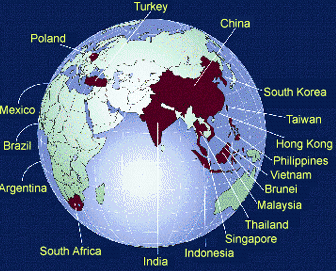
2013 Analysis of the Perception of Emerging Economy Countries on the Future of the UNDS
The opinions of those surveyed from the 14 EECs, taken as a whole, reveal slightly more optimism (or less skepticism) about the UNDS than the rest of the global sample, based on perceptions of the UN's capacity to change and face new challenges.
When asked about the effectiveness of the UN in 20 different domains, the EEC respondents judged that the four most effective areas are health, human rights, education and gender. The EEC public placed more importance on regional cooperation than the global sample, possibly reflecting the growing interest in South-South cooperation. This also extends to the EEC respondents awarding a higher rating to all the UN regional commissions than the global sample.
Three principal challenges for the UNDS to address in the future, in the opinion of the EEC, emerged in the survey:
Challenge 1: Lack of Financial Resources for the UNDS
To respond to this challenge, a large majority of respondents agree or strongly agree that over the next five years the UNDS should:
- merge agencies in similar fields (78% agree);
- increase funding from non-traditional donors and developing countries (78% agree);
- augment funding from private sources (77% agree);
- reduce overall system-wide costs of management (72% agree).
Challenge 2: Ineffectiveness of the UNDS
There was strong consensus on proposed future changes to increase effectiveness:
- simplify business procedures (85% agree);
- establish harmonised system-wide independent evaluations (76% agree);
- develop single system-wide information and communications platform (75% agree);
- develop unified system-wide development results indicators (75% agree).
And in the longer-term, up to 2025, the UNDS should:
- include NGO and private sector representatives in governing bodies (65% agree);
- appoint a single specialized head of the UN Development System (63% agree);
- reduce the number of UN organisations (53% agree).
Challenge 3: Access to competencies of the UNDS
To increase this access, EEC respondents were in agreement that, in the next five years, the UNDS should:
- merge agencies in similar fields (78% agree);
- shift people and resources from headquarters to the field (74% agree).
Optimism triumphs overall, however, despite the acknowledgement of much room for improvement, as over 80% of respondents from the 14 key emerging economy countries believe that the UN Development System is capable of handling its own organizational challenges.